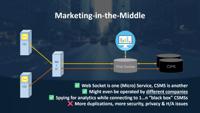Enhancing OCPP with E2E-Security and Binary Data Streams for a more Secure Energy Ecosystem
- Track: Energy: Reimagining this Ecosystem through Open Source devroom
- Room: H.2214
- Day: Saturday
- Start: 11:40
- End: 11:55
- Video only: h2214
- Chat: Join the conversation!

In the rapidly evolving landscape of electric vehicle charging, the Open Charge Point Protocol (OCPP) has emerged as a crucial industry standard for communication between charging stations and a central management system. In my presentation I will introduce groundbreaking extensions to OCPP, focusing on the integration of end-to-end digital signatures and binary data streams, a leap forward in efficiency and security within the EV charging ecosystem.
The integration of binary data streams via HTTP Web Sockets into OCPP marks a significant enhancement in data transmission efficiency. This approach not only reduces latency and bandwidth usage for large data transfers, but also paves the way for more secure, in-band data transmissions like firmware updates or log file transport. Traditionally, such data transfers required separate HTTP or FTP servers, introducing unnecessary complexity and potential network security risks. With these extensions firmware updates become seamless and more secure, directly within the OCPP framework.
Furthermore, the addition of digital signatures to OCPP commands and data structures, such as charging tariffs or grid related commands for controllable consumers according to the German §14a EnWG, introduce a new layer of security and integrity. These signatures ensure that data is not tampered with during transmission - even beyond the traditional scope of OCPP - providing a verifiable trust mechanism in end-to-end EV charging communications and might in the future lead to more cost-efficient intelligent measuring systems.
A notable advancement is the use of digital signatures for creating distinct user roles within OCPP. Until now, OCPP lacked the capability to differentiate between user access levels, such as "normal" users and "admin" users. The introduction of role-based access control, underpinned by digital signatures, allows for precise management of user permissions, enhancing both security and operational efficiency especially in more complex managed charging locations.
In my talk, I will delve into the technical implementation details of these extensions. Attendees will gain insights into the practical applications and benefits of these enhancements in the context of the Open Source energy ecosystem. The presentation will also explore the potential future implications and developments that these extensions could usher in, setting the stage for a more secure, efficient, and scalable EV charging infrastructure.
Speakers
| Achim Friedland |